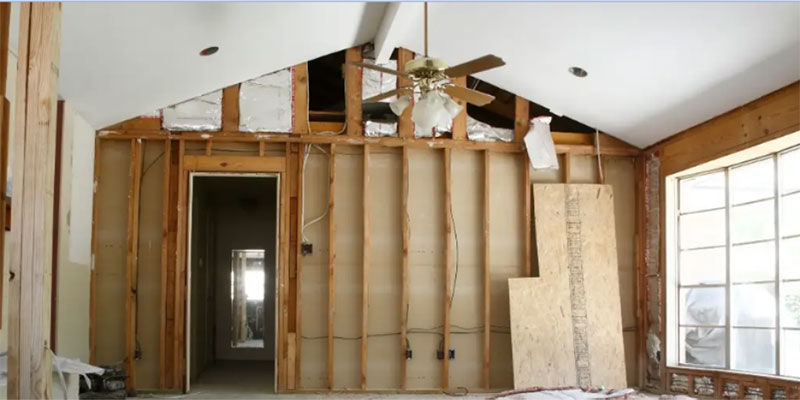How Construction Loans Can Finance the Home of Your Dreams
Nov 09, 2023 By Susan Kelly
A mortgage may be necessary to finance the purchase of your ideal home. However, constructing your ideal home? That can call for an unconventional mortgage. To be more specific, a loan for the building.
A construction loan is defined here.
Mortgages for construction or renovation purposes typically have shorter terms and higher interest rates. Based on predetermined construction milestones, a construction loan is repaid in stages by the lender to the contractor, not the borrower. Once a house is finished being built, the construction loan is either refinanced into a permanent mortgage or paid off.
Obtaining a construction loan can be challenging, but building allows you to customize your home to your specifications. Before starting construction, you should familiarise yourself with the various types and how to select a lender.
Various Forms of Construction Loans
Permanent loans for construction
When construction is finished, a construction-to-permanent loan becomes a traditional mortgage. Single-close construction loans, sometimes known as "fixed-rate" loans, have fixed interest rates at the time of closing. This is the option if your construction plan is basic and you're looking for a fixed-interest rate loan.
Financing for building only

Loans for the construction phase of a project are sometimes referred to as "two-close" construction loans because they require repayment only after the structure has been finished. Borrowers must go through the qualification process, obtain approval, and pay closing costs multiple times for these loans. If you plan to keep looking for a permanent lender while you build, construction-only loans are an option.
Home Improvement Loans
Large-scale home improvements can be financed with a renovation construction loan at the outset of the mortgage process. After all necessary repairs and improvements, the property's value is used to determine the loan amount. A loan like this could be a good option if you want to buy a home that needs work but doesn't have the funds.
Loan for a New Building
Unlike a traditional mortgage, no collateral is involved when taking out a construction loan. Because of the increased risk associated with lending to you, more paperwork and verification will be required before they release any funds. Your architect, builder, and finances will all be scrutinized closely.
"Expect the architectural plans, your builder, and your finances to be scrutinised in great detail."
The funds for a construction loan are dispersed differently from a standard loan. Home construction loans are typically disbursed to the contractor in stages, or "draws," rather than one large sum. The foundation is poured, framing, and finishing all coincide with separate draws.
Loans for home renovations

According to Sean Faries, CEO of Land Gorilla, a software company for construction lenders based in San Luis Obispo, California, if your dream home needs a lot of TLC, a renovation construction loan allows you to wrap upgrade and repair costs into your permanent mortgage.
The FHA 203(k) loan, the USDA Single Family Housing Guaranteed Loan Program, and Fannie Mae's HomeStyle Renovation Mortgage are all examples of popular renovation loan programs.
A construction loan can be advantageous for large-scale remodeling projects because the interest rate is typically lower than that of a personal loan or home equity line of credit, and the repayment period is typically longer.
Get yourself ready for the builder's inspection.
In a standard mortgage, only the borrower and the lender are involved; however, in the case of construction loans, the builder is also a party to the transaction. Hiring a reliable contractor who can finish the work on time and within budget is critical.
"Do some investigating by looking at the contractor's previous work and contacting references. Verify that they have submitted and received approval from the appropriate local building authority, and that they are prepared to move forward with the project "To quote Faries:
Obtaining Financing for a Building Project
The minimum credit score, maximum debt-to-income ratio, and down payment necessary to obtain a construction loan will, as with any mortgage, differ from one lender to the next. Usually, the amount of money you borrow will determine how stringent the requirements are.
Financial institutions will look at the following details:
Your debts should be at most 45% of your annual income, although a lower ratio is preferable to lenders.
Credit rating: 680 or higher is typically required by construction loan providers.
Initial Investment Generally, a 20%-30% initial investment is needed for new construction, though some renovation loan programs may be more lenient.
Lenders for construction-only loans may want to know how the money will be repaid once the project is finished being built.
On this page
A construction loan is defined here. Various Forms of Construction Loans Permanent loans for construction Financing for building only Home Improvement Loans Loan for a New Building Loans for home renovations Get yourself ready for the builder's inspection. Obtaining Financing for a Building Project Financial institutions will look at the following details:
Top 4 Best Commodity Trading Books Of 2022

Interactive Brokers vs. TD Ameritrade: Understanding the Differences

How Construction Loans Can Finance the Home of Your Dreams

2024's Essential Guide to the 7 Best Invoicing Software for Small Businesses

TQQQ vs. QQQ

How To Get A Mortgage Refinance Even If You Have Bad Credit

Webull Review 2024: Free Trading App for Beginner and Pro Investors

New Jersey Payroll Guide: Step-by-Step Teachings for Small Businesses

How to Create a Roth IRA Backdoor

Ways To Build A Bond Ladder To Boost Returns

TimeTrex 2024 Review: Is It the Right Workforce Management Tool?
